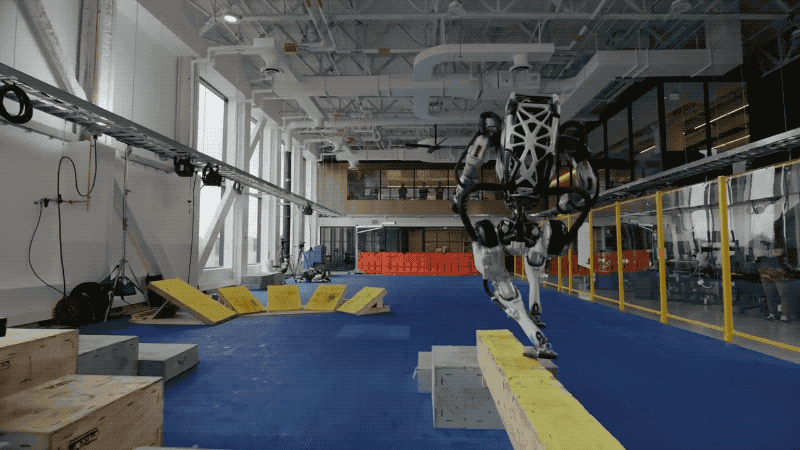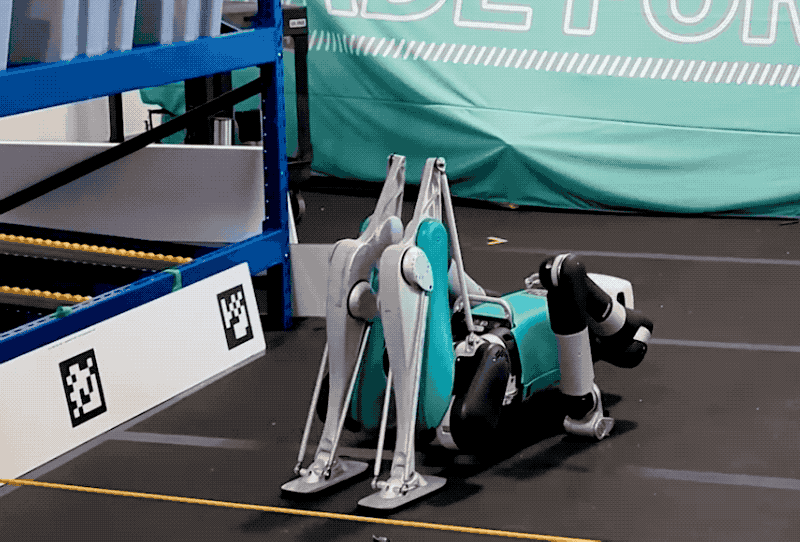The savvy marketers at Boston Dynamics produced two major robotics news cycles last week. The larger of the two was, naturally, the electric Atlas announcement. As I write this, the sub-40 second video is steadily approaching five million views. A day prior, the company tugged at the community’s heart strings when it announced that the original hydraulic Atlas was being put out to pasture, a decade after its introduction.
The accompanying video was a celebration of the older Atlas’ journey from DARPA research project to an impressively nimble bipedal ’bot. A minute in, however, the tone shifts. Ultimately, “Farewell to Atlas” is as much a celebration as it is a blooper reel. It’s a welcome reminder that for every time the robot sticks the landing on video there are dozens of slips, falls and sputters.

I’ve long championed this sort of transparency. It’s the sort of thing I would like to see more from the robotics world. Simply showcasing the highlight reel does a disservice to the effort that went into getting those shots. In many cases, we’re talking years of trial and error spent getting robots to look good on camera. When you only share the positive outcomes, you’re setting unrealistic expectations. Bipedal robots fall over. In that respect, at least, they’re just like us. As Agility put it recently, “Everyone falls sometimes, it’s how we get back up that defines us.” I would take that a step further, adding that learning how to fall well is equally important.
The company’s newly appointed CTO, Pras Velagapudi, recently told me that seeing robots fall on the job at this stage is actually a good thing. “When a robot is actually out in the world doing real things, unexpected things are going to happen,” he notes. “You’re going to see some falls, but that’s part of learning to run a really long time in real-world environments. It’s expected, and it’s a sign that you’re not staging things.”
A quick scan of Harvard’s rules for falling without injury reflects what we intuitively understand about falling as humans:
- Protect your head
- Use your weight to direct your fall
- Bend your knees
- Avoid taking other people with you
As for robots, this IEEE Spectrum piece from last year is a great place to start.
“We’re not afraid of a fall—we’re not treating the robots like they’re going to break all the time,” Boston Dynamics CTO Aaron Saunders told the publication last year. “Our robot falls a lot, and one of the things we decided a long time ago [is] that we needed to build robots that can fall without breaking. If you can go through that cycle of pushing your robot to failure, studying the failure, and fixing it, you can make progress to where it’s not falling. But if you build a machine or a control system or a culture around never falling, then you’ll never learn what you need to learn to make your robot not fall. We celebrate falls, even the falls that break the robot.”

The subject of falling also came up when I spoke with Boston Dynamics CEO Robert Playter ahead of the electric Atlas’ launch. Notably, the short video begins with the robot in a prone position. The way the robot’s legs arc around is quite novel, allowing the system to stand up from a completely flat position. At first glance, it almost feels as though the company is showing off, using the flashy move simply as a method to showcase the extremely robust custom-built actuators.
“There will be very practical uses for that,” Playter told me. “Robots are going to fall. You’d better be able to get up from prone.” He adds that the ability to get up from a prone position may also be useful for charging purposes.
Much of Boston Dynamics’ learnings around falling came from Spot. While there’s generally more stability in the quadrupedal form factor (as evidenced from decades trying and failing to kick the robots over in videos), there are simply way more hours of Spot robots working in real-world conditions.

“Spot’s walking something like 70,000 kms a year on factory floors, doing about 100,000 inspections per month,” adds Playter. “They do fall, eventually. You have to be able to get back up. Hopefully you get your fall rate down — we have. I think we’re falling once every 100-200 kms. The fall rate has really gotten small, but it does happen.”
Playter adds that the company has a long history of being “rough” on its robots. “They fall, and they’ve got to be able to survive. Fingers can’t fall off.”
Watching the above Atlas outtakes, it’s hard not to project a bit of human empathy onto the ’bot. It really does appear to fall like a human, drawing its extremities as close to its body as possible, to protect them from further injury.
With a 99% success rate over about 20 hours of live demos, Digit still took a couple of falls at ProMat.
We have no proof, but we think our sales team orchestrated it so they could talk about Digits quick-change limbs and durability. #ConspiracyTheories pic.twitter.com/aqC5rhvBTj
— Agility Robotics (@agilityrobotics) April 6, 2023
When Agility added arms to Digit, back in 2019, it discussed the role they play in falling. “For us, arms are simultaneously a tool for moving through the world — think getting up after a fall, waving your arms for balance, or pushing open a door — while also being useful for manipulating or carrying objects,” co-founder Jonathan Hurst noted at the time.
I spoke a bit to Agility about the topic at Modex earlier this year. Video of a Digit robot falling over on a convention floor a year prior had made the social media rounds. “With a 99% success rate over about 20 hours of live demos, Digit still took a couple of falls at ProMat,” Agility noted at the time. “We have no proof, but we think our sales team orchestrated it so they could talk about Digits quick-change limbs and durability.”
As with the Atlas video, the company told me that something akin to a fetal position is useful in terms of protecting the robot’s legs and arms.
The company has been using reinforcement learning to help fallen robots right themselves. Agility shut off Digit’s obstacle avoidance for the above video to force a fall. In the video, the robot uses its arms to mitigate the fall as much as possible. It then utilizes its reinforcement learnings to return to a familiar position from which it is capable of standing again with a robotic pushup.
One of humanoid robots’ main selling points is their ability to slot into existing workflows — these factories and warehouses are known as “brownfield,” meaning they weren’t custom built for automation. In many existing cases of factory automation, errors mean the system effectively shuts down until a human intervenes.
"We'll be singing / when we're winning." 🔊 pic.twitter.com/51DYD1Avvg
— Brian Heater (@bheater) August 17, 2021
“Rescuing a humanoid robot is not going to be trivial,” says Playter, noting that these systems are heavy and can be difficult to manually right. “How are you going to do that if it can’t get itself off the ground?”
If these systems are truly going to ensure uninterrupted automation, they’ll need to fall well and get right back up again.
“Every time Digit falls, we learn something new,” adds Velagapudi. “When it comes to bipedal robotics, falling is a wonderful teacher.”































Comment